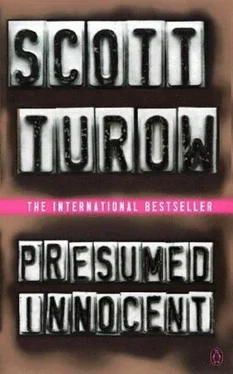Scott Turow - Presumed innocent
Здесь есть возможность читать онлайн «Scott Turow - Presumed innocent» весь текст электронной книги совершенно бесплатно (целиком полную версию без сокращений). В некоторых случаях можно слушать аудио, скачать через торрент в формате fb2 и присутствует краткое содержание. Жанр: Детектив, на английском языке. Описание произведения, (предисловие) а так же отзывы посетителей доступны на портале библиотеки ЛибКат.
- Название:Presumed innocent
- Автор:
- Жанр:
- Год:неизвестен
- ISBN:нет данных
- Рейтинг книги:4 / 5. Голосов: 1
-
Избранное:Добавить в избранное
- Отзывы:
-
Ваша оценка:
- 80
- 1
- 2
- 3
- 4
- 5
Presumed innocent: краткое содержание, описание и аннотация
Предлагаем к чтению аннотацию, описание, краткое содержание или предисловие (зависит от того, что написал сам автор книги «Presumed innocent»). Если вы не нашли необходимую информацию о книге — напишите в комментариях, мы постараемся отыскать её.
Presumed innocent — читать онлайн бесплатно полную книгу (весь текст) целиком
Ниже представлен текст книги, разбитый по страницам. Система сохранения места последней прочитанной страницы, позволяет с удобством читать онлайн бесплатно книгу «Presumed innocent», без необходимости каждый раз заново искать на чём Вы остановились. Поставьте закладку, и сможете в любой момент перейти на страницу, на которой закончили чтение.
Интервал:
Закладка:
After the game, we head home alone. No one has been so heartless as to suggest we skip the picnic, but it is for the best. We attended once after the indictment, and the time passed so fitfully, with such sudden ponderous silences arising at the mention of the most ordinary topics-work to which I do not go; TV detective shows that turn on predicaments like mine-that I knew we could not return. These men are generous enough to accept my presence among themselves. The risk I pose is for the kids. We all must think about the months ahead, the impossibility there would be of explaining where I'd gone and what I did. It is unfair to hobble these splendid evenings with the omen of evil. Instead, Nat and I depart with a friendly wave. I carry the bat, the glove. He goes along stomping out dandelions.
From Nathaniel, there are no words of complaint. I am pathetically touched by this, by my son's loyalty. God only knows what mayhem his friends are wreaking on him. No grownup can fully imagine the smirking wisecracks, the casual viciousness he bears. And yet he refuses to desert me, the vessel from which this pain has poured. He does not dote. But he is with me. He pulls me to my feet from the sofa to work with him on the slider; he accompanies me at night when I venture out to get the paper and a gallon of milk. He walks beside me through the small woods between our subdivision and the Nearing village green. He shows no fear.
"Are you scared?" I ask suddenly tonight as we are walking.
"You mean scared you won't get off?" The trial looms so near, so large, that even my eight-year-old knows at once what I must mean.
"Yes."
"Naw."
"Why not?"
"I'm not, that's all. It's just a bunch of junk, right?" He squints up at me, from beneath the bill of his cockeyed baseball cap.
"In a manner of speaking."
"They'll have this trial, and you'll tell what really happened, and that'll be the end of it. That's what Mom says."
Oh, bursting, bursting heart: that's what his mom says. I put my arm around my son, more amazed than ever by his faith in her. I cannot imagine the lengthy therapeutic sessions between mother and child in which she has pitched him up to this level of support. It is a miracle which Barbara alone could have achieved. As a family, we are bound together by this symmetry: in the world, I love Nat most, and he adores his mother. Even at this scrappy age, full of the furious energy of a person of eight, he softens for her as no one else. She alone is allowed to hold him at length; and they enjoy a special sympathy, communion, a dependence that goes deeper even than the unsounded depths of mother and child. He is more like her than me, high- strung and full of her driving intelligence, those dark and private moods. She equals his devotion. He is never out of her imagination. I believe her when she says she could never wrest from herself the same emotion for another child.
Neither of them parts from the other comfortably. Last summer Barbara spent four days in Detroit, visiting a college friend, Yetta Graver, who she discovered is now a professor of mathematics. Barbara called twice a day. And Nat was like a running sore, crabby, miserable. The only way I could quiet him for bed was by imagining for him precisely what his mother and Yetta were doing at that moment.
They are in a quiet restaurant, I would tell him. Each of them is eating fish. It is broiled with very little butter. They each have had a glass of wine. At dessert they will break down and eat something they find too tempting.
Pie? asked Nat.
Pie, I said.
My son, the one I always dreamed of, fell asleep thinking of his mother eating sweets.
Chapter 24
"Hi," Marty Polhemus says.
"Hi," I answer. As I came off the landing and caught my first glimpse of the figure and the long hair, I thought it was Kemp, who I'm supposed to meet here. Instead, I find this boy, who I have not even thought about for months. We stand alone in the hallway outside Carolyn's apartment looking at one another. Marty extends his hand and shakes mine firmly. He has no obvious reluctance, almost as if he is pleased to see me. "I didn't expect to see you," I finally say, casting about for some way to ask why he is here.
From his shirt pocket, he pulls a copy of Judge Lyttle's order allowing us to inspect the premises. "I got this," says Marty.
"Oh, I get it now," I say out loud. "That was only a formality." The judge ordered us to notify the lawyer for the estate, a former P.A. named Jack Buckley. Jack apparently sent the notice on to the boy. "The idea was just to let you object if you mind us going in and looking at some of Carolyn's things. You didn't have to be here."
"That's okay." This boy sort of shucks and bows as he talks. Back and forth. He shows no sign of leaving.
I try to make conversation, ask what he is up to. "Last time we talked you were planning to flunk out and go back home."
"I did," he says, without ceremony. "Actually, I got like suspended. I flunked physics. And I made a D in English. I was pretty sure I was going to flunk that, too. I went home six weeks ago. I just drove back here yesterday to get together all my junk."
I apologize and explain that from his presence I had assumed that things had worked out.
"Well, they did. Work out. I mean, so far as I'm concerned."
"How'd your father take it?"
He shrugs.
"He wasn't real happy. About the D especially. That like hurt his feelings. But he said I had a tough year. I'll work for a while and go back." Marty looks around at nothing in particular. "So anyway, when I got that thing, I thought I'd like to come by and see what it was all about."
The psychologists have a term, 'inappropriate.' That is this kid. Just sort of shooting the breeze outside the apartment where his mother was killed with the guy who everybody thinks did it. For a second, I wonder if he even knows what's going on. But the caption was right on the notice: PEOPLE VERSUS SABICH. And he could not have missed the buildup to the indictment in the papers. He has not been gone that long.
I do not get a chance to probe further, because Kemp comes along then. I can hear him on the stairs. He is arguing, and when he turns the corner off the landing I see with whom-Tom Glendenning, a big cop I never much liked. Glendenning is a white man's white man. Lots of ethnic and racial cracks. Not kidding around either. His whole sensibility revolves around the fact that he was born white and is now a cop. He treats everybody else like they're intruders. No doubt he'll be just as happy to view me that way. The more there are, the better Tom feels. Kemp is explaining that Glendenning may not enter while we view the apartment, and Glendenning is saying that's not what he understands from Molto. Finally, they agree that Glendenning will go downstairs and use the phone. While he's gone I introduce Kemp to Marty Polhemus.
"You're right," Glendenning says when he comes back. "That judge entered such an order." The way he says "that," you know what he's thinking. Kemp rolls his eyes. He is a good lawyer but still awfully Ivy League. He will not hesitate to let people know when he regards them as fools. A large phosphorescent-orange notice with an adhesive backing has been applied to the door of Carolyn's apartment. It states that this is a crime scene, sealed by order of the Superior Court of Kindle County, and that entry is forbidden. The notice overlaps the threshold so that the door cannot be opened. The locks have been filled with plastic blocks. Glendenning cuts the notice with a razor, but it takes him some time to clear the locks. When he finishes, he produces Carolyn's key ring from his pocket. It has a large red-and-white evidence tag on it. There is a door handle lock, and a dead bolt. As I told Lipranzer a long time ago, Carolyn did not fool around.
Читать дальшеИнтервал:
Закладка:
Похожие книги на «Presumed innocent»
Представляем Вашему вниманию похожие книги на «Presumed innocent» списком для выбора. Мы отобрали схожую по названию и смыслу литературу в надежде предоставить читателям больше вариантов отыскать новые, интересные, ещё непрочитанные произведения.
Обсуждение, отзывы о книге «Presumed innocent» и просто собственные мнения читателей. Оставьте ваши комментарии, напишите, что Вы думаете о произведении, его смысле или главных героях. Укажите что конкретно понравилось, а что нет, и почему Вы так считаете.












